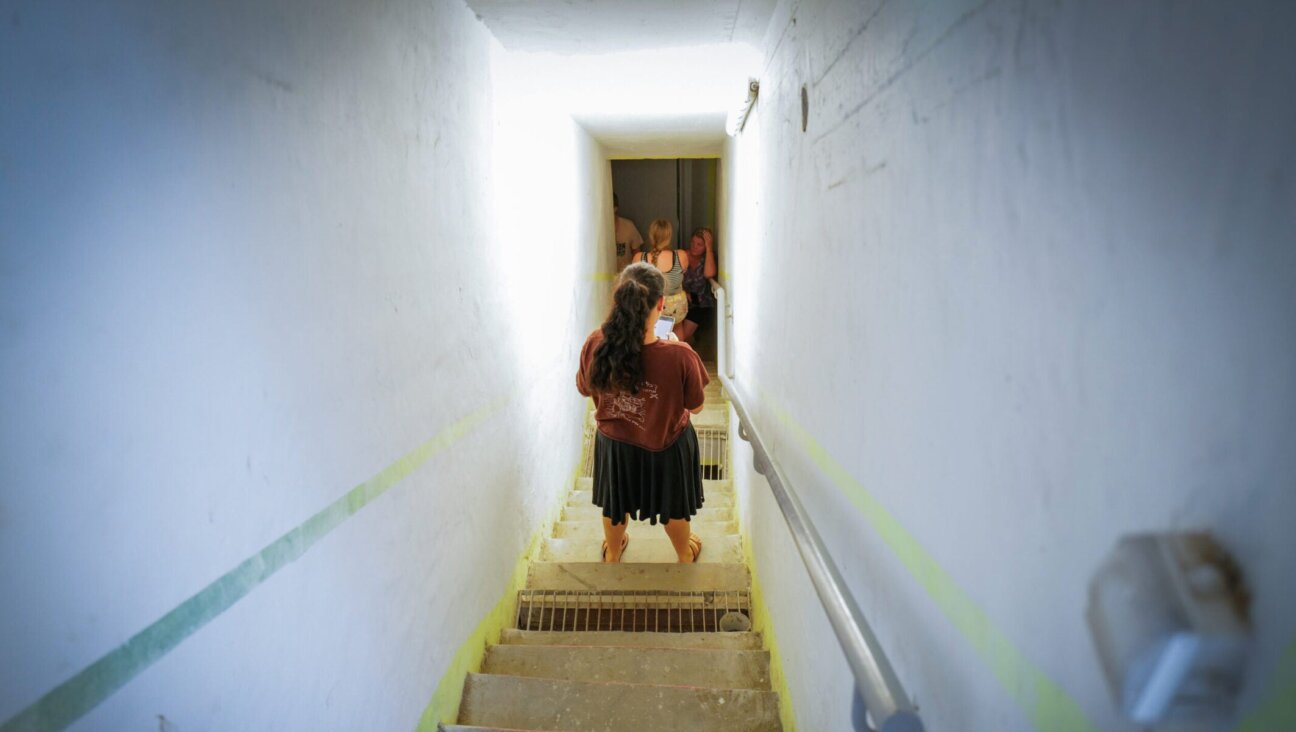Turkish Terror Attack Helps Ties With Israel but Hurts Tourism

Nitza (L) the wife of Avraham Goldman, 69, who was killed in a suicide bombing in Istanbul on March 19, 2016 mourns with their children at his funeral. Image by Getty
TEL AVIV — In the immediate aftermath of the Istanbul suicide attack that killed three Israeli tourists March 19, Turkish leaders sent condolences to the victims’ families and otherwise seemed to move to repair diplomatic ties between the two nations. The terrorism even may have inadvertently created momentum for normalization talks.
But that doesn’t mean that the attack — suspected to have been at the hands of the Islamic State group — will bring Israelis and Turks closer together. Israeli tourists, who once thronged to Turkish beaches, will likely stay away from Turkey now that deteriorating security there has dramatically hit home.
Turks “were hopeful that the political process would make more Israeli tourists go to Turkey, but this will not happen,” said Gallia Lindenstrauss, a researcher at Israel’s Institute for National Security Studies.
Israeli tourism to Turkey was in its “honeymoon period” in the 2000s, Lindenstrauss said, following the improved relationship between the two nations starting in the 1990s. Israeli travelers were seduced

Soldiers carry on March 20, 2016 the coffin of an Israeli, who was killed in an Istanbul suicide bombing. Image by Getty
by the short, two-hour flight to Istanbul from Tel Aviv and by the Turkish beaches and cuisine that awaited them. Turkey’s predominantly Muslim population, she said, was part of the draw for some Israelis, giving them a sense of belonging in the greater Middle East.
“The feeling that you are accepted in the region also added to the appeal of going to Turkey for many people,” Lindenstrauss said.
The destination, she said, became even more popular as Israeli companies purchased vacation packages to Turkey, offering their employees discount fares. According to The Marker, an Israeli economic newspaper, more than half a million Israelis visited Turkey in 2008.
Israeli tourism to Turkey dropped abruptly in 2010, when the Mavi Marmara, a Turkish ship full of activists, attempted to breach the Israeli blockade of Gaza. Israeli commandos raided the ship, and nine Turkish activists were killed in the fight that ensued; another one later died of his wounds. Israel faced international accusations of excessive force, as Abdullah Gul, who was then the Turkish president, called the raid an attack on Turkey itself.
Israelis, acting out of both national pride and fear, began to abandon one of their favorite vacation destinations. In 2010, just 109,000 Israelis traveled to Turkey, The Marker said.
Eshet Tours, an Israeli tour company, completely canceled its flights to the Turkish resort town of Antalya in the wake of the Mavi Marmara incident. It maintained flights to Istanbul, although business travelers mostly populated those, said Galit Zakai, Eshet’s marketing manager.
“The strategic decision was that it was not worth it anymore to take full flights [to Antalya], and let’s find other destinations,” she said. Instead, the company began marketing vacations to Malta, Cypress and other Mediterranean destinations.
Since 2010, Israel and Turkey have been on a slow but bumpy path toward rapprochement. Tensions flared again in 2014, when Turkish Prime Minister Recep Tayyip Erdogan said that Israel “surpassed Hitler in barbarism” in its military campaign in Gaza, which killed more than 2,100 Palestinians, mostly civilians, and more than 70 Israelis, mostly soldiers.
Yet at the same time, some Israelis were returning to Turkish shores. One estimate on Ynet, an Israeli news site, said that there were 200,000 Israeli visitors in the first 10 months of 2015. According to Israeli tour operators, the increase can likely be credited to Israeli Arabs. The Jewish population hasn’t made quite the same comeback.
“It is [fewer] Jewish Israelis because they are still afraid,” Zakai said. “They are not feeling secure.”
The tourists who were killed in the recent suicide bombing were on a culinary tour in Istanbul, a niche market that doesn’t represent broader trends in Israeli tourism.
“The group who was caught up in the terrorist attack was unusual,” the Issta tour company said in a statement to the Forward. “Most of the tourists who travel to Turkey travel to Antalya rather than Istanbul, and most are Israeli Arabs.”
Yet whether or not the attack spells further doom for Israeli tourism to Turkey depends in part on an investigation of the bombing. Immediately after the attack, Israeli officials announced that they were looking into whether Israelis were targets, a claim widely disregarded in the Israeli press. Now, a Turkish newspaper report said that the attacker followed the Israelis before detonating the bomb, and this has revived the claim.
The Prime Minister’s Office upgraded the security threat from an “ongoing potential threat” to a “basic concrete threat,” advising Israelis not to go to Turkey.
According to Ziv Rosen, CEO of Gulliver, another Israeli travel agency, the attack could likely dampen Passover holiday travel to Turkey. In a statement, he said his company was offering “alternative sunbathing vacations” in the Greek Islands.
Contact Naomi Zeveloff at [email protected] or on Twitter, @NaomiZeveloff

















